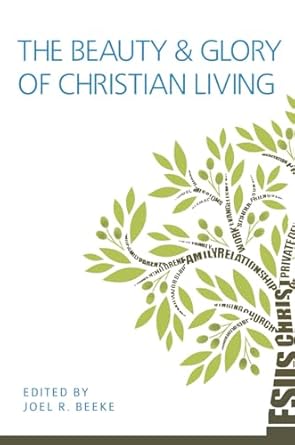Reviewed by J. Stephen Yuille
The Beauty & Glory of Christian Living consists of the twelve addresses delivered at the 2013 Puritan Reformed Conference, an annual conference hosted by the Puritan Reformed Theological Seminary in Grand Rapids, Michigan. In this book, Joel Beeke (the president of the seminary) has edited the twelve addresses, and arranged them according to three sections.
“Christian Living in Its Divine Roots”
The first section contains four chapters, considering the source of Christian living. Together, the chapters demonstrate that Christian living is rooted in Christ and cultivated by the Holy Spirit, who produces spiritual-mindedness in God’s people through the ordinary means of grace. Ian Hamilton comments, “It is the Word preached, made visible in the sacraments, applied to the life of the church, and voiced in Spirit-inspired prayer that the Holy Spirit uses to make us more like our Lord Jesus Christ” (p. 45).
When it comes to Christian living, the relationship between grace and obedience is extremely significant. If we fail to maintain the balance between the two, we create all sorts of confusion and inflict all sorts of damage. The two most common mistakes people make are as follows. Some think they can obey God without knowing His grace (which leads to moralism), while others think they can know God’s grace without obeying Him (which leads to libertinism).
This first section strikes the balance between grace and obedience, stressing the fact that we must begin with the “hidden life” (who we are) before moving to the “seen life” (how we live). As Michael Barrett remarks, “It is always the case that right thinking about the gospel produces right living in the gospel” (p. 3).
“Christian Living in Its Human Branches”
The second section contains three chapters, explaining how growth in Christ-likeness is made evident in the principal spheres of life. Chapter 5 deals with the family, specifically God’s purpose and principles for marriage, the spirit of parenting, and the tasks of parenting. Chapter 6 deals with the workplace, highlighting God’s design and desire for our particular vocations. Chapter 7 focuses on what it means to live evangelistically in a fallen world.
 We often forget that the reality of our Christian profession shows itself primarily in the mundane of daily living. Many of us give the impression (consciously or not) that the heart-beat of the Christian faith is found in solving theological puzzles, pursuing grandiose experiences, enduring great hardships, mastering spiritual disciplines, or engaging in cutting-edge ministries. While not disparaging any of those things, we need to remember that they don’t represent the heart-beat of the Christian faith. This place of distinction belongs to our most familiar relationships.
We often forget that the reality of our Christian profession shows itself primarily in the mundane of daily living. Many of us give the impression (consciously or not) that the heart-beat of the Christian faith is found in solving theological puzzles, pursuing grandiose experiences, enduring great hardships, mastering spiritual disciplines, or engaging in cutting-edge ministries. While not disparaging any of those things, we need to remember that they don’t represent the heart-beat of the Christian faith. This place of distinction belongs to our most familiar relationships.
This second section places the emphasis in the right place. Joel Beeke stresses the fact that “the Christian’s relationship with his family is inseparable from personal sanctification” (p. 68). William VanDoodewaard demonstrates that God’s kingdom is expressed by “a beautiful, honorable integrity in respectful submission toward those in workplace authority” (p. 81). For their part, Brian Najapfour and Josh Dear make it clear that evangelism is a “vital part” of our life in Christ (p. 91).
“Christian Living in Its Earthly Storms”
The third section contains five chapters, demonstrating how Christians are to live during seasons of affliction. Chapter 8 explains why we should be prepared for suffering. Chapters 9–11 address three specific cases of affliction: living in an immoral world; living in a hostile culture; and living through sickness and death. Chapter 12 provides a brief look at the Book of Judges, emphasizing the “tenacity of God’s grace over the trauma of our sin” (p. 159).
Probably far more often than we care to admit, we murmur under God’s yoke. We tend to allow affliction to disrupt our marriages, ministries, relationships, and a host of other things. This often leads to murmuring, which is really an ungrateful sin because it means we’ve lost sight of God’s abounding grace in our lives. Moreover, it renders us vulnerable to rashness and bitterness, opening the door of our heart to all sorts of sins.
This third section orients our thinking heavenward. In particular, Gerald Bilkes reminds us that “every furnace the Christian endures comes from the sovereign and all-sufficient God” (p. 116). God is sovereign; thus his control is absolute. He’s immutable; thus his will is certain. He’s mighty; thus his power is limitless. He’s wise; thus his plan is perfect. He’s incomprehensible; thus his providence is inscrutable. While not always understanding God’s ways with us, we’re absolutely certain he’s in control.
Recommendation
The Beauty & Glory of Christian Living will assist Christians in living out the faith. It features excellent expositions of God’s Word. It also includes many helpful insights from the Puritans. The writing style makes the book accessible to all, while its subject matter makes it profitable to all.
Dr. J. Stephen Yuille is Pastor of Grace Community Church, Glen Rose, TX, Director of Baptist Studies at Redeemer Theological Seminary, Dallas, TX, and Book Review Editor for Spirituality and Christian Living here at Books At a Glance.
